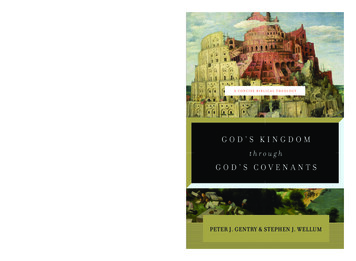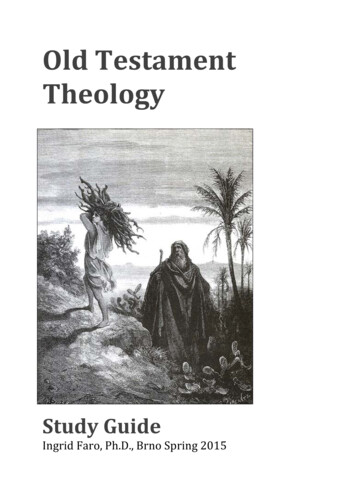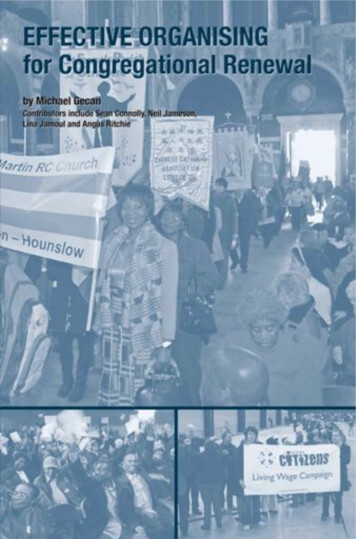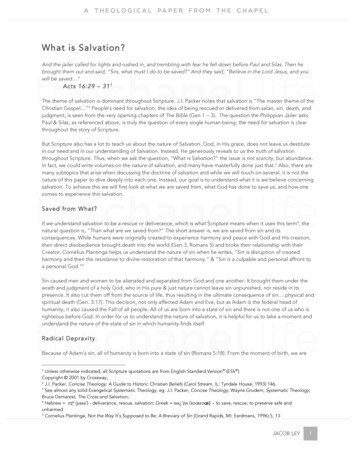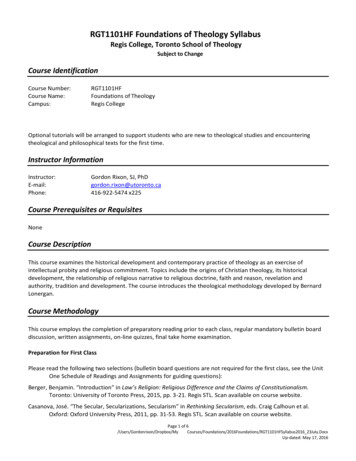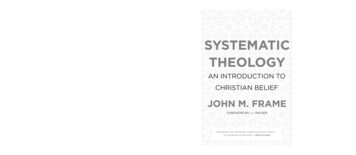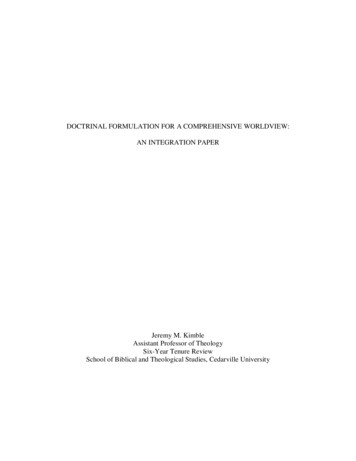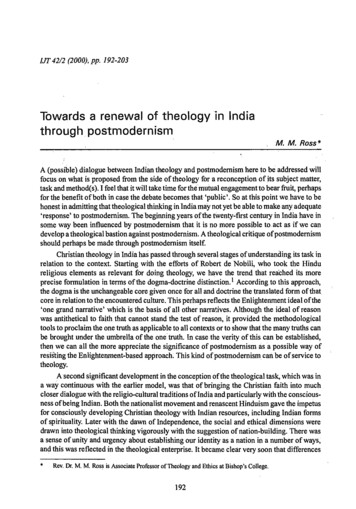
Transcription
/JT 4212 (2000); pp. I 92-203Towards a renewal of theology in Indiathrough. postmodernismM. M. Ross*A (pos ible) dial.ogue between Indian theology and postmodemism here to be addressed willfocus on what is proposed from the side of theology for a reconception ofits subject matter,task and method(s). I feel that it will take time for the mutual engagement to bear fruit, perhapsfor the benefit of both in case the debate becomes that 'public'. So at this point we. have to behonest in admitting that theological thinking in India may not yet be. able to make any adequate'response' to postmodemism. The beginning years ofthe tWenty-first century in India have insome way been influenced by postmodernism that it is no more possible to act as if we candevelop a theological bastion against postmodernism. A theological critique of postmodernismshould perhaps be made through postmodemism itself.·Christian theology in India has passed through several stages qfunderstanding its task inrelation to the context. Starting with the efforts of Robert de Nobili, who took the Hindureligious elem nts as relevant for doing theology, we have the trend that reached its moreprecise formulation in terms ofthe dogma-doctrine distinction. 1 According to this approach,the dogma is the unchangeable core given once for all and doctrine the anslated form of thatcore in relation to the encountered culture. This perhaps reflects the Enlightenment ideal of the'one grand narrative' which is the basis of all other narratives. Although the ideal of reasonwas antithetical to faith that cannot stand the test of reason, it provided the methodologicaltools to proclaim the one truth as applicable to all contexts or to show that the many truths canbe brought under the umbrella of the one· truth. In case the verity of this can be established,then we can all the more appreciate the significance of postmodernism as a possible way ofresisting the Enlightenment-based approach: This kind ofpostmodernism can be of service totheology.Asecond significant development in the conception of the theological task, which was ina way continuous with the earlier model, was that of bringing the Christian faith into muchcloser dialogue with the religio-cultural traditions oflndia and particularly with 'the consciousness of being Indian. Both the nationalist movement and renascent Hinduism gave the impetusfor consciously developing Christian theology with Indian resources, including Indian formsof spirituality. Later with the dawn of Independence, the social and ethical dimensions weredrawn into theological thinking vigorously with the suggestion of nation-building. There wasa sense of unity and urgency about establishing our identity as a nation in a number of ways;and this was reflected in the theological enterprise. It became clear very soon that differences Rev. Dr. M. M. Ross is Associate Professor ofTheology and Ethics at Bishop's College.192
RENEWAL OF THEOLOGY IN INDIAin social, religious and ethical principles and practices were so great, and so too economicdisparities between communities, that they stood in the way of building up the nation in termsof a progressive civil code or social justice system. So although national ideals are not forgotten, there needs to be development at micro-levels for consensus-building to happen at higherlevels. This is a thread that theology needs to pick up, and this essay suggests postmodemismas having something to offer.The third Christian theological approach started with the awareness of structural factorsoflndian society that were oppressive and exploitative of sections of society. The political andeconomic dominance of certain groups came to be recognized as symptoms of an infectionthat was damaging to every form of individual and social life. The concepts of' liberation' and'humanization' became the watchwords of theologians in India, but Kappen laments in 1986that "no distinctive school of thought among Indian Christians that may be called theology ofliberation" has emerged. 2 Perhaps the Indian reality eludes the possibility of a 'school' ofliberationist thought emerging as Kappen would have wanted -along the lines of a 'foundational theology ofliberation' as suggested by him in the same article. And certainly the laboursof many cannot be discounted and should be appreciated for .,.- maybe not so much theirinsights in respect of a general praxis methodology but - the way they have presented thetheological demand for liberation through their rigorous social analyses of particular groups.The present scenario in which we have to do theology calls for a recognition of theinadequacy ofthe idea of realization of liberation by a group on its own and through its ownresources. Even the approach that certain economic considerations and justice oncems arising out of past exploitations being the source of privileged positioning of the oppressed groupin policy-making has its own defects. Dfspite the importance of and need for seeing liberationin specific terms, there is the danger of) the 'social' and the 'we' becoming exclusive. Even aspecific liberation theology's acknowledgment of the Kingdom of God as an experience offuller community which includes the whole creation may be nothing more than a utopia because there is no attempt to express it as a state in the present. I think this pushing of the 'fuller'and the 'all' to the future does injustice to some fundamental theological insights. In this essayI want to explore the possibilities that postmodemism can offer in this regard to Christiantheology in India, particularly the way it can renew liberation theology.·In the part to follow I will discuss briefly some of the key themes ofpostmodemism thatwill serve the above-mentioned purpose. Even specialists in the field ofpostmodemism admitthe difficulty they have in defming postmodemism and connecting the important tenets aspropounded in different disciplines and varying arenas and contexts. Postmodernism, as weshall see, has been embraced and defined by various eminent thinkers who have seen theirspecial interests calling them to oppose modernism. Thus poststructuralism, postliberalism,deconstruction, social constructionism, feminism are all in one way or another postmodem inorientation. One important observation that speaks not so much for the consistency ofpostmodern thought but for the specific character of postmodem theory and practice shouldearn for postmodemism both credibility and a facilitator status. As the aim of this paper is tohighlight the significant postmodem concepts that would help Christian theology discoveritself anew in the present context, we will not enter into any detailed discussion of specificschools of thought and their consistency, except in passing and by pointing to some (logical)connections or mutual relationships between certain ideas. Only engaging some significantvoices both for their specific critique of modernism and concrete philosophical and pragmatic193
MMROSSorientations. will be undertaken here. The task will include presenting some aspects ofpostmodemism that will connect with the demands of a theology which is capable of addressing India's lo ging and blee.ding.IThe question that is frequently asked and .debated in the Western context, namely whetherpostmodernity is a prevailing 'cultural and economic condition or whether it is a philosophythat is emerging with certain flexible features, could be taken as our starting point. This debateis relevant here for two reasons. First, I think, it brings up some of the key ideas ofpostmodemism. And second, it can give us an occasion to examine the forms of postmodemityas present in India, particularly whether it comes as an active invasion of the West or fromw!thin Indian developments. Or is there an exchange between India and the world in thisregard. Certainly we have not experienced postmodernism's emergence in a cataclysmic manneras it did in France following the failu e of the student riots ofMay 1968. In the French situation,postmodemism meant the voices of the margins persistently fighting the right-wing politicalpowers. Postmodemism as resistance to the privileged classes received the support of theacademia andthe media. It may thus be seen as the voice of democracy. 3 Since we have nosingle moment such as the one in France to ground our discussion historically, we have to startwith some key concepts ofpostmodemism. And maybe in keeping with the postmodern spirit,we should see how our own life-orientations and practices reflect postmodernism or somethingakin to it.Apart from the historic uprising in France with which postmodemism was speciallyconnected, postmodemism emerged as a new form particularly in architecture, the arts, literatureand philosophy. Later feminists and theologians also followed suit.The most important concept that the prominent schools connected with postmodernismworked with was the nature of the human self.i. The human self as constructed and relationalPostmodemism rejected the modernist conception of the human subject as an unmade, distinctand rational self and that he/she is a subject of experiences, actively ordering his/her experiencesand working on material reality and other people as if the latter were objects. Postmodernismsuggests that more of the play of the forces on the individual is in evidence rather than theother way round. While modernism saw the rational individual as only acting on the world andother humans, postmodemism recognized the affective and receptive character of the humansubject. The subject is not to be seen as controlling the world as some given raw fact, but asexperiencing himself and the world being born together at every critical point. In contrast tofoundationalist metaphysics which offers the possibility of discovering reality, postmodernismsees everything as being created, constructed.The conception of the human person in postmodernism, as Graham Ward points out, isfree from the modernist notion of the self as an agent of a cogito. Now the self is seen more asa 'body' that is self-motivated, self-transcending and open to direction from the other, fromoutside.(1997:588) The suggestion here is that postmodernism challenges theology to developalong lines of non-absoluteness and differentiatedness ·as virtues in relation to God and thehuman.194
RENEWAL OF THEOLOGY IN INDIAFeminist postmodemists have a special interest in rejecting the idea of the individualsubject as a fixed and autonomous self (man) who through reason is able to master nature,including woman, who is assumed to be set in opposition to him. The postmodem feminist,Stisan Hekman, calls for"an epistemology that does not have man as its centre".(l992:93)She suggests the abandoning of the Enlightenment idea of an all-knowing subject who controlsthrough social organizations and through various discourses by resisting such discourses withthe power of language which postmodemism has shown to be "fluid and multiple" and whichis open to "revision and mutation".{l992: 189) We might wantto askthe question: Is not Hekmanlabouring on a point which (non-feminist) postmodern discourse has already proposed, namelythat of decentring the human subject? From a feminist perspective however, although inspired .by the general idea of 'no centre' or 'decentring', it is important to proceed from one's ownexperience and perspective to engage with the other (here, man) as a partner rather than adic tor.ii. Nature of knowledgePostmodemism rejects modernism's superior role given to scientific knowledge above whatcan be called 'knowledge' in religion, morality and art. Richard Rorty for instance points outthat science cannot claim that it is representing or 'mirroring' a reality 'out there'. Whatever issaid to be true and valid either theoretically or empirically is/are bound up with the 'conceptualframeworks' of a given community or culture, and it can be asserted that nothing other thansuch frameworks existed.(l979:275) Thus if the modernist science-based claim that what isobservable is to be trusted is thrown into question by pointing to Aristotelian and Newtoniandivergences, and particularly Rorty's planation that "Newton was better than Aristotle notbecause his words better corresponded'. to reality but simply because Newton made us better·able to cope", (1979:269) then intern l conflict is manifest in science itself over a period oftime. So this would mean that science c not show its method as a paradigm ofknowledge andgo on to suggest that its method will judge the validity of knowledge in other spheres. Evenless should scienc.e contemplate its ability to embrace and integrate truths from other arenasinto an all-inclusive framework.The suggestion by Rorty that cultural values shape the acceptance of certain scientifictheories, particularly referring to Galileo's version of the universe, emphasizes the need tocheck science's self-validating attitude. Rorty speaks in a manner that upholds the differentfunctions of the two approaches in their own realms, when he says:[T]he crucial consideration is whether we know how to draw a line between science andtheology, such that getting the heavens right is a "scientific" value, and preserving thechurch and the general cultural structure of Europe is an "unscientific value".(1979:327-8)The question we might want to put before the above approach is whether the de lineation ofscience and culture should stop with a suggested cultural 'imperialism'- scientific truth beingauthenticated through cultural development and ethos -or whether mutual influence betweenthe two are witnessed and advocated. It might therefore be observed that the oppression religion,ethics and art experienced under liberal thought are now removed through postmodern theory.The confidence in what postmodernism has achieved in this way makes Baudrillard lamentthat many people fail to understand this concept that, "we have now moved into an epoch .where195
MMROSStruth is entirely a product of consensus values, and where 'science' itself is just the name weattacl). to certain modes ofexplanation.(Norris 1990: 169).Coming from a poststructuralist angle, Foucault's suggestion that all knowledge is relatedto power is noteworthy. His attempt, like that of other postmodemists, was to throw into questionthe claims of objectiVity and neutrality in scientific knowledge. He sees the subject's performancein three levels: knowledge, power and ethical action. (Dreyfus & Rabinow 1983:237) Theselevels are free from any hierarchy. Rather they are to be seen in relation to each other. Hepoints out a basic connection between knowledge and power. Knowledge is a technique of·power, and on its part knowledge needs a system of communication, which is the exercise ofpower. (Davis 1994:163). Foucault contributed to postmodemism by showing how powerplayed a role in everyday practices of people and how it influenced the systematization ofknowledge. He pointed out that one implication of seeing everyone active in determiningpower relations should call into question history as facts presented from the rulers' point ofview. Rather underlayers of suppressed and unconscious knowledge should be recognized ascrucial for the history of a particular group because they are responsible for that society toachieve its identity. (Appignanesi 1995:83)iii Theory of MeaningPostmodernism rejects the approach of the distinction between essence and appearance, depthand surface, the inside and the outside in hermeneutics. Meaning cannot be reached in anyconcrete way because there is no realitY other than the words, images and signs used to refer.That is, there is no referent. There can be no real other than the signifiers. Any suggestion of arealm of the unrepresentable and the unknowable is futile, and it cannot claim to be real. Weonly have the plane of immanence. Connor points out that in postmodemism the old distinctionbetween knowing and experience is overcome with the suggestion that meaning is found everymoment with no discernible pattern in its movement. (1989:4)For Derrida meaning is consistently deferred in favour of a chain of signifiers. There isno immediate presence of the addresser, and a direct communication beyond a web of signs. Inother words, everything is a text; there is no being or event before or beyond the text. Theconsequence of this understanding for theology is that it questions God as the speaker andGod's ability to speak directly (revelation) to the creatures. Such theology is abandoned toremain consistent with the postmodem rejection ofdualisms of spirit/body, speech/writing andpresence/representation that engender the privileging of the first over the second. (Ward1992:264-6) While such an enterprise does give theology real scope to work with writtentexts and experiences too as texts, it can be charged for fallh:tg short of the ability to affirm anyvalue as valid and to champion the cause of the oppressed.What is becoming clear is that academicians are beginning .to see religion not from theside of clerics or texts, but from the side of the common pers01i 's way of making sense ofreligion. James Beckford affirms thatputatively post-modem forms of religion would embrace diversity of discourse and theabandonment of unitary meaning systems; cross-references between, and pastiches of,different religious traditions; collapse of the boundary between high and popular formsofreligion; and an accent on playfulness or cynicism. (1992:20)196
RENEWAL OF THEOLOGY IN INDIAThe method of deconstruction as suggested by Derrida .is also a postmodem. approachwhich analyzes texts to find exceptions to the general rule in contrast to the positivist exegesisof fmding the main theme and harmonizing the rest of the text with that theme. This wouldmean that a deconstruction or interpretation is hardly likely to yield any absolute point, whichrepresents one side of a legitimized dichotomy. Even such dichotpmies will need to bedeconstructed. The approach is that nothing is to be accepted and nothing is to be rejected. Infact obscurity is to be preferred and even celebrated. Derrida's suggestion in connection withthe text is that the basic meaning is one that an individual brings.to the text. This can applyeven to representing social reality, that there is no particular history that can give meaning to agroup for instance, rather it has to be seen in terms of"playfulness". 4The postmodem interest in novelty, multiplicity and fluidity are all possible due to theone important philosophical denial of a transcendental signified, the borders for the play ofsignifications being infinitely widened, as Derrida claims. (1978:280)iv. Beyond MetanarrativesJ-F. Lyotard's approach is there are no metanarratives which can be used to make sense ofeverything. Nor should there be a self-legitimization as science does, posing as some 'firstorder' narrative as opposed to popular narratives. The task of legitimization itself should beseen as redundant, for popular accounts and significations should freely play their role inholding culture together and enriching culture. (See Davies 1994: 155) Lyotard sees experienceand knowledge too diverse to be put into a scientific form. So he argues against such ametanarrative, and claims that each di 6ourse has its own set of rules guiding them. What wasonce the indulgence of a few who fuifilled the academic demand for realism in art throughindividual genius and elite craftsmanship has now been surpassed by the 'mass' instruments ofindustrial photography and the cinema. In the place of a "Grand Theory" (totalizing explanationsin history, science and culture) which an represent all knowledge and explain everything,localizing and contingent theories are being suggested. Another important postmoderncontribution is that of highlighting the 'little traditions'.The emergence of contextual theories as a result of the collapse of the core-pheripheryapproach is a welcome sign. However, the point must be raised about the possibility and scopeof theorizing about common concerns in the different contexts.,, The aim of metanarratives is to affirm a certain completeness and a whole picture. It isthe desire for mastery, including intellectual mastery. But on the one hand this is not somethingthat .can happen across realms and disciplines given the richness and diversity, and the pluralityand depth of reality as a whole. So a fragmentation takes place when specialization catches up.Crook and others see modernity's attempt at differentiation of cultural spheres leading to aproliferation of divisions and in the process making distinctions between cultural spheresredundant. (1992:36,69) Representation of the social has multiplied in the present time that ittakes away any idea of the real as possible. The eroding of the certainty and stable culturalforms that the modernist-capitalist system provided has led to the easy coming together of thehigh and the low.·On the other hand, mastery can also lead to violence. The emphasis on a realist way ofknowing coupled with developing a metanarrative can lead to making ourselves and others fit. into what is believed to be the 'real out there'. Hence Albert Borgmann's labelling of a realistmetaphysics as "aggressive realism". (1992:27)197
MMROSSv. Beyond LiberationThe modernist approach looked forward to a stage where conflicts will be overcome either inthe way Hegel proposed it or in the leftist, reality-changing way of Marx. Postmodernism isseen to reject any universalistic political projects, including emancipatory ones, which areconsidered as acceptable in general and human terms. Postmodernism is of course sensitive toand open towards particular struggles against particular oppressions. Rorty points out that acommunity determines its course of action and future not by adopting a definite standpoint toreach a goal but through negotiated standpoints and through trial and error. (1991: 16-7) Nouniversal course of action for humanization can be followed when there is no basis forformulating a universal theory of justice.Frederick Jameson, a Marxist originally, sees postmodemism in the light of the newdevelopment of capitalism. His suggestion is that postmodernism is 'the cultural logic of latecapitalism'. This capitalism so named as 'late' has invaded the most resistant of social andcultural systems and conquered them. The fairly independent economies and socio-politicalsystems of the Third World have now been captured by late capitalism, thi-ough a process ofcommodification. According to Jameson postmoden:tism celebrates this commodificationinstead of resisting it as modernism used to do.The key themes of postmodemism thus far seen will now be discussed· in the light oftheological concerns in the Indian situation with a view to identifying Christian theology'stheological methods and viable role in theory and practice in the Indian situation(s).IIThe best form of interaction of two systems leading to best results happens when what isunique in each and what is critical to each are allowed to emerge as each system speaks foritself. Identifying common grounds between two frameworks is usually held to be the workablemodel. Of course it can be a good starter, but the danger is that of reaching a. minimalistconsensus, leaving the real meat untasted!In this section we will identify briefly some ways in which postrnodemism can contributeto methodological issues in theology. Following that we will consider whether postmodernismcan contribute to contextual theologies like liberation theology.i. Postmodernism and Theological MethodThe question of method is about criteria that can validate how certain facts and concepts are to.be interpreted in a given system. So obviously reflective protocol rnquires all discussion to·start at that !eve t, while adequately attending to existential realities which have contributed tothe given formulation. Postmodernism calls for an approach where all willing participants cancome together and to play their games. In the new global situation which offers awareness,inter-connections and inter-mingling, different worlds are encountered by the individual. Andhe/she need not look to one's social order for approval, but freely engage in dealing with whatmight look as opposites. (Beckford 1992: 11-23). Whereas existentialism throws the individualinto the world without any resources, postmodernism affirms meaninglessness as meaning.Meaninglessness in not absence of meaning, but meaning which lends itself to manyinterpretations. From a theological perspective, Felix Wilfred is aware oftheology's "partial"and "provisional" character ( 1998: 128) and is determined by the character of the "many fronts"198
RENEWAL OF THEOLOGY IN INDIA(1998:130) with which theology assumes a dialogical posture. However, Wilfred does notmanage to keep this openness all along, where a certain an experiential and praxis concernleads him to state dogmatically that option for the poor is a "definite option" as it is from GodGodself. I am not saying that experiences of the poor cannot come into framing criteria fortheological method. But unless being poor itself is seen in a number of ways in addition to theeconomic factor, theology will cease to be a creative and envisioning enterprise.· It wouldbecome nothing more than developing arguments for a programme of liberation.A second aspect of theological method that can be taken from postmodernism is thepositive appraisal of difference. Here difference is not attributed to various influences,conditionings, and prejudgments but is seen as the authentic mode of desire, creativity andbeing-with-the-other. Postmodernism first expressed this method in its critical response to theWestern liberal tradition based on sameness in otherness, unity in diversity. In respect of thedegree of such affirmation of difference, postmodernism goes full-scale to the extent ofcelebrating difference. It suggests the multiplying of particulars. In contrast to this approach,.liberation theology sees difference as a product of structural social conditioning. This wouldmean that the division is something to be overcome. Liberation theology views difference interms of collectivity This perhaps is the primary approach to difference. The secondary onecan be positive in.that difference is connected with participation of the many with their distinctneeds and perspectives. One further di!itinction is that for postmodemism, difference is almostan end, that is, one moves towards a unique self-realization. In the case of liberation theologydifference is related to the background or the social positioning which is the starting point foranalysis. Can liberation theology tinla way of going beyond a people group and renew itselfwith microscopic and macroscopic v/'ewpoints and analyses.A thirdmethodological stand dfpostmodernism lies in its refusal to accept any formalauthority as the basis of its formulation or which serves as the test of its approach. Formalreligion expects conformity ofthe individual to the given beliefs and practices. It promisesidentity in social terms and security and peace. Charles Davies suggests that the new religiousidentity people are seeking is not determined by one tradition but by the resources of many,and ends with a striking postmodern note with regard to the individual and a judgment on thehegemonic character of institutional religion:Personal autonomy is not a rebellion, but the gift of the Spirit. Conformity is not a virtue,but a lack of confidence in the Spirit that makes us free. A communication open to all asfree persons and undistorted by domination is the descent of the Spirit of lqve. ( 1994: 152)I would stand for the shift of seeing religion as it is being expressed by the individual. Theproblem in this of course is that the individual becomes the sole creator of his/her form ofreligion. This would raise the question of finding channels to bring people together to facecommon issues in a concerted manner. It will further raise the question of what 'community is'and 'what role it would play' in the life of the individual, without the individual being seen asconforming to something formal which community dictates.The earlier point being about authority and personal autonomy, the implications of thatfor any helpful relationship between the individual and the community should concern us nowas a fourth point. Let us recall the postmodern belief that knowledge is not derived from anobjective referent. This premise might suggest knowledge can become a victim of subjectivity.Now if we link this premise with another important postmodem premise, namely 'the other',199
MMROSSthen we can expect the other to represent his/her community in providing an occasion forencounter so that pure subjectivity as the source of knowledge could be avoided. How certainviews and concepts take shape in a community can become subject matter for reflection. Perhapswhat John Reader says in connection with leaders of oppressed groups taking caution not toexpress their views so strongly that the voices of the people of such groups go unheard is to thepoint. Both the difference and sameness between the leaders and the people should find ap'Iace in a common frame:There are both sameness and radical alterity, both symmetry and asymmetry, identity anddifference in our relationships with others. The task is to do justice to and respect this .'both/and' structure. (1994:91)5A final point is one which in fact is both an affirmation of the value ofpostmodemism togive some theoretical undergirding to e sense of history that people possess and a critique oftendencies· in postmodemism in relation to history. In the West it is increasingly the case of adisappearance of sense ofhistory, people being unabie to retain their own past both in termsof personal values and social institutions. Constant changes in ihe political, economic a
Towards a renewal of theology in India through. postmodernism M. M. Ross* A (pos ible) dial.ogue between Indian theology and postmodemism here to be addressed will focus on what is proposed from the side of theology for a reconception ofits subject matter, task and method(s). I feel that it w

